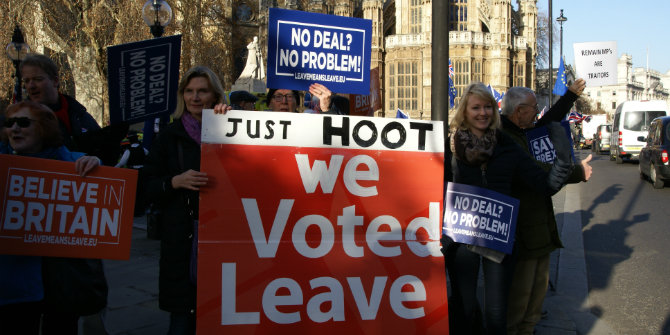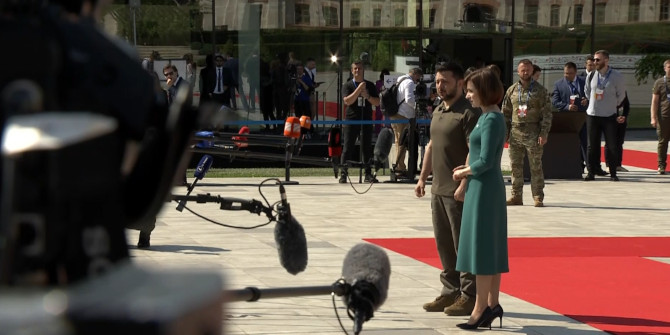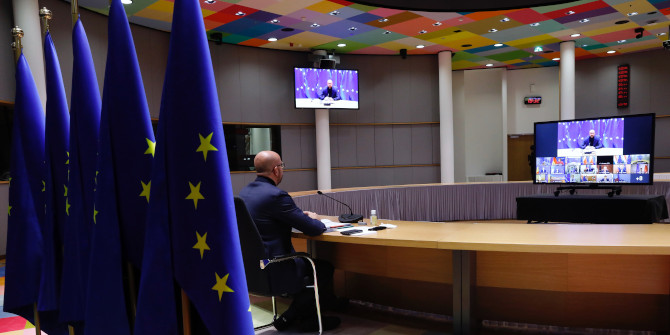 Recent votes in the UK Parliament prove that it is no more capable of agreeing where to go next on Brexit than the cabinet. As Theresa May creates the temporary illusion of party unity, a no-deal Brexit grows ever closer, writes John Ryan. However, the political fallout associated with the economic hit of No Deal – or any form of harder Brexit – should not be underestimated, he warns.
Recent votes in the UK Parliament prove that it is no more capable of agreeing where to go next on Brexit than the cabinet. As Theresa May creates the temporary illusion of party unity, a no-deal Brexit grows ever closer, writes John Ryan. However, the political fallout associated with the economic hit of No Deal – or any form of harder Brexit – should not be underestimated, he warns.
The House of Commons voted last week 317 to 301 in favour of the amendment tabled by Conservative MP Graham Brady and backed by the government, which calls for the Irish backstop in the Withdrawal Agreement to be replaced with “alternative arrangements.” Meanwhile, Conservative MP Caroline Spelman’s amendment, which stated that the UK should not leave the EU without a deal, but which has no legislative force, was passed by 318 votes to 310.
The most critical amendment in the UK Parliament last Tuesday evening was the conservative party former Attorney General Dominic Grieve’s “take back control” amendment which was defeated 321-301 – a majority of 20 against giving MPs six days to take control of the parliamentary timetable from the government to debate Brexit and alternative forms of Brexit. The Labour MP Yvette Cooper amendment, which was intended to enable the Commons to vote to block a No Deal Brexit, was defeated by 321 votes to 298 – a majority of 23. All this means that Theresa May will be sent back to Brussels to negotiate the impossible.
Following last week’s vote in Parliament, a spokesman for European Council President Donald Tusk said, “The Withdrawal Agreement is, and remains, the best and only way to ensure an orderly withdrawal of the United Kingdom from the European Union,” adding, “The backstop is part of the Withdrawal Agreement, and the Withdrawal Agreement is not open for renegotiation.” Theresa May has been warned by the Irish government that there is no chance of the backstop being changed or removed from the withdrawal agreement. Simon Coveney, the Irish Foreign Affairs minister and deputy Prime Minister, has dismissed suggestions that the European Union could remove the insurance policy, warning that “Ireland will insist on the United Kingdom keeping its word.” Coveney had stated that the backstop was not up for discussion, warning that replacing it with an “aspirational hope” was not a “reasonable” approach. The European Parliament has also been clear in stating repeatedly that it would not support a withdrawal agreement without a backstop in it.
The great hope of the business community is that MPs of all parties, who fear No Deal, will come together to stop it. The votes so far show that Parliament is not capable of agreeing where to go next on Brexit any more than the UK government’s Cabinet is.
While neither Parliament nor government wants no deal, it remains the default outcome. Unless Britain revokes Article 50, the EU agrees to extend the Brexit deadline beyond 29th March or a satisfactory agreement between the UK and EU is found, the UK will leave the EU without an agreement in place. While this would leave the UK free to pursue a domestic and international agenda without hindrance by EU rules, the immediate disruption, an unavoidable hard border between Northern Ireland and Ireland will make for a very uncomfortable position economically and politically.

Credit: ChiralJon (CC BY 2.0)
The political fallout associated with the economic hit of No Deal – or any form of harder Brexit – should not be underestimated. There is a range of different ways to forecast the cost of hard Brexit scenarios. We know that higher barriers to trade, investment and migration will damage UK productivity growth; or that British consumers will be forced to buy more expensive imports or lower quality British alternatives, hitting living standards. It will probably be a mix of the two, but that mix is hard to quantify. What is more, the Brexit referendum in 2016 coincided with robust global growth. With signs of a slowing global – and European – economy, the costs of Brexit would be more acute. The immediate damage would be enormous, if only because of the uncertainty and the lack of preparation, both among governments and companies both in Britain and the EU.
A no-deal Brexit can only be stopped if UK MPs come together around a positive majority for another solution. Then it would be possible to request an extension to Article 50 to allow the UK to continue to develop its preferred outcome. The defeats of the Grieve and Cooper amendments suggests MPs are willing to give Theresa May more time to find a deal that can command a majority.
UK politics is in turmoil and in a chronic crisis. The phenomenon of British exceptionalism towards the EU is set to take a new dramatic turn, while the UK’s chaotic political divisions will not disappear any time soon. The Prime Minister also promised yesterday to make a statement to MPs no later than February 13 – and put it to the vote the following day – St Valentine’s Day in the UK. If she proposes the same deal that MPs rejected two weeks ago, perhaps with a few minor changes she will be attacked by all sides. MPs may start to change their votes towards avoiding a no deal scenario. The clock is ticking and time is running out for the UK and the EU.
May yesterday built a temporary sense of unity in her own party by capitulating to Brexiteers demands, but in reality, raised expectations that she can get substantive compromises from the EU on the Irish backstop are illusionary. The contradictory positions that May has taken over the last few weeks have damaged the level of trust that the EU 27 had in her ability to avoid a No Deal Brexit by accident. The EU 27 has stayed united so far but may feel the pressure as a no Deal Brexit becomes a reality. The endgame is emerging and the conservative government and their media supporters will prepare the ground to blame the EU as the culprit for the impending No Deal. For many observers in the UK and EU, the unity of the conservative party seems to be more important the UK government than guarding the national interest.
This article gives the views of the author, and not the position of LSE Brexit, nor of the London School of Economics.
Please read our comments policy before commenting.
Note: This article first appeared on our sister site, LSE Brexit. It gives the views of the author, not the position of EUROPP – European Politics and Policy or the London School of Economics.
_________________________________
 John Ryan – LSE IDEAS
John Ryan – LSE IDEAS
John Ryan is a Visiting Fellow at LSE IDEAS. He was a fellow at the St Edmund’s College, University of Cambridge and the German Institute for International and Security Affairs, Berlin, Germany. John is working as a senior partner in consultancy as a Brexit adviser for EU, Gulf and Asian clients.






The impasse in the cabinet, Parliament, and the country seems impossible of early resolution. Wise counsel advised an extension of time or other means but these may risk greater uncertainty and division. With such division it is very difficult to see how this reflects what some call “the will of the people.” Unfortunately this country lacks the leadership of certain great statesmen such as Franklin Roosevelt or Winston Churchill who were able eventually to carry public opinion with them through difficult times. Thus, historians may consider that sometimes it is not just a policy that is wrong but those who attempt to execute it.
This post is pure Remain Central …..
… and in accordance with the Comment Guidelines about “strong criticism” I will explain why.
1) “The Withdrawal Agreement is, and remains, the best and only way to ensure an orderly withdrawal of the United Kingdom from the European Union, ”
Endorsing a quote from Donald Tusk doesn’t make it accurate. i.e. the W.A, is NOT “the best and only way ….etc”
The UK should seek to apply WTO Article 24, S5 (b) & (c) – which allows for ZERO tariffs while a Trade Agreement is being negotiated – for up top 10 years.
Thus “business-as-usual” would be the default.
2) “The great hope of the business community is that MPs of all parties, who fear No Deal, will come together to stop it ”
Is there one entity called “the business community” ?
Is that an academically rigorous assertion ?
“Fear” may be just that – an unjustified emotion.
3) “the immediate disruption, an unavoidable hard border between Northern Ireland and Ireland will make for a very uncomfortable position economically and politically. ”
More unsupported assertions !
a) Please explain where and how “the immediate disruption” comes from….
…. given that “no additional checks” will conducted, according to:
– the bosses of HMRC, UK Border Force and Calais Port
– the Mayor of Calais and the head of the Pas-de-Calais Region
So if the people on the ground are going to be sensible – and seek “business-as-usual” …. who is going to order this “disruption” ???
b) “hard” border “unavoidable”. Why ? How ?
If the Irish & UK Governments and the EU have all said “no new infrastructure” ….
… from where is this fantasy “hard border “coming from?
Who is ordering the materials ? Who will do the work ?
4) “The political fallout associated with the economic hit of No Deal – or any form of harder Brexit – should not be underestimated.”
The unsupported assertions keep coming !
What “economic hit” ? How much (in £) – and based on what assumptions ?
A complete breakdown of trade flows ? What ?
Thers is no such thing as a “hard” Brexit – let alone a “harder” Brexit.
The ballot paper said “Leave” – clear, clean and unambiguous.
How about:
“The political fall-out from not respecting the UK’s biggest democratic vote – should not be under-estimated” ??
5) “We know that higher barriers to trade, investment and migration will damage UK productivity growth; or that British consumers will be forced to buy more expensive imports or lower quality British alternatives, hitting living standards.”
a) Please detail the barriers to trade and investment that is assumed – who has said they will introduce them – and why ? ,
b) Migration has hardly been an economic “good”.
Sure … a 0.5% increase in population should result in a 0.5% increase in GDP ….. but doesn’t help GDP per head
….and the huge costs associated with mass, unplanned migration are rarely calculated …
They ARE felt by every low income person via the increased cost of housing – anything from £1,000 to £5,000 p.a. depending on region.
….. And then there is the cost of overcrowded schools, delays in health care, slower journey times.
So how has mass immigration helped productivity ?
c) Why will British consumers be “forced” to buy more expensive imports?
Especially when the UK can reduce the EU’s tariffs on food clothing and shoes.
“lower quality British alternatives”.
Doesn’t the author think this just a little insulting ?
As for umpteenth assertion “hitting living standards”…..
Will poorer families object to cheaper food, cloths and shoes outside the EU’s protectionist tariffs ?
Maybe a little more disposable income might relieve the pressure on the welfare state.
6) “The immediate damage would be enormous ”
Assertion ! How much is this “damage”?
Presumably the auther has not read the economists who argue that EU membership imposes costs roughly 11% of GDP – and that leaving should remove some of these costs.
Will poorer families object to cheaper food, cloths and shoes outside the EU’s protectionist tariffs ?
Maybe a little more disposable income might relieve the pressure on the welfare state.
7) “MPs may start to change their votes towards avoiding a no deal scenario.”
Hopefully MPs will continue the trend towards understanding that “no deal – or rather WTO – as the more sensible option.
The lies of Project Fear Mk2 have always left the starting block fast – and unchallenged by a Remain media ….
……but as more voters (and MPs) realise that:
– WTO is familiar to businesses and HMRC
– there is no “must” about extra checks at a border
– (optional) checks can be done inland.
– the UK has a £47 million SURPLUS with leading WTO countries
– the UK has a huge £96 billion DEFICIT with the EU
….. that unshackling from the EU could be immensely beneficial.
8) “capitulating to Brexiteers demands ”
Why not “implementing the biggest democratic vote in UK history” ?
In short my “strong criticism” of this piece is that it bears few hallmarks of a well-researched or evidenced academic piece.
“Presumably the auther has not read the economists who argue that EU membership imposes costs roughly 11% of GDP – and that leaving should remove some of these costs.”
This is a figure from a UKIP “research paper” authored by Tim Congdon (a former UKIP candidate) in 2013. The calculation itself is based on multiple nonsensical assumptions such as an EU regulation cost of 5.5% of GDP, claiming there has been a direct cost to the UK economy from “lost jobs” going to EU immigrants, and that EU budget payments cost around 1.25% of GDP when the actual figure is closer to 0.5%. And no, I don’t expect most academics have read ludicrous papers like this one.
I would suggest that if you think a serious “well-research and evidenced academic piece” should be taking politically motivated, intellectually bankrupt UKIP figures as a starting point then you’re not being very reasonable. Of course that’s fairly standard for these kinds of comments – railing against academic bias then quoting information almost exclusively from political campaign material that has about as much credibility as a chihuahua in a pair of glasses.
Theo,
Thanks for signposting to Tim Congdon’s piece.
It was a refreshing read – acknowledging that there are many different figures from many different methodologies – and that it is hard to pin down “correct” figures.
Even the Govt’s reporting of GDP has to be qualified as the “GVA” method.
Relevantly – and surely reasonably – he makes it clear that he has no expectation that leaving the EU would result in an 11% benefit to the UK
“EU budget payments” of ~£20 billion were clearly order of magnitude nearer 1 1/4%.
Is your 0.5% the EU fans favoured “net” figure – after payments to the UK that the EU decides where to spend ?
If you are going to assert that an “EU regulation cost of 5.5% of GDP is nonsensical” … at least have the courtesy to give a clue as to “why” – rather then trashing the author.
As for your dismissing ” lost jobs going to EU migrants” … I have no idea what Congdon included ….
but it seems pretty obvious if that some of the 3 million EU citizens send money “home”, then that money is “lost” to the UK economy – so “lost jobs” seems fair.
Eurostat said that remittances by EU citizens from the UK were £ 5.3 billion – which was about 0.3% of GDP.
Congdon said 3/8%
Congdon’s research does not appear to cover the enormous higher housing cost from millions of extar people seeking homes.
So maybe he understated the cost of EU membership !